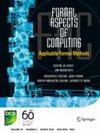Algebra-Based Reasoning for Loop Synthesis
IF 1.4
4区 计算机科学
Q3 COMPUTER SCIENCE, SOFTWARE ENGINEERING
引用次数: 3
Abstract
Provably correct software is one of the key challenges of our software-driven society. Program synthesis—the task of constructing a program satisfying a given specification—is one strategy for achieving this. The result of this task is then a program that is correct by design. As in the domain of program verification, handling loops is one of the main ingredients to a successful synthesis procedure. We present an algorithm for synthesizing loops satisfying a given polynomial loop invariant. The class of loops we are considering can be modeled by a system of algebraic recurrence equations with constant coefficients, thus encoding program loops with affine operations among program variables. We turn the task of loop synthesis into a polynomial constraint problem by precisely characterizing the set of all loops satisfying the given invariant. We prove soundness of our approach, as well as its completeness with respect to an a priori fixed upper bound on the number of program variables. Our work has applications toward synthesizing loops satisfying a given polynomial loop invariant—program verification—as well as generating number sequences from algebraic relations. To understand viability of the methodology and heuristics for synthesizing loops, we implement and evaluate the method using the Absynth tool.基于代数的回路综合推理
可证明正确的软件是我们软件驱动社会的主要挑战之一。程序综合——构建满足给定规范的程序的任务——是实现这一目标的一种策略。这个任务的结果就是一个设计正确的程序。与程序验证领域一样,处理循环是合成程序成功的主要因素之一。我们提出了一种合成满足给定多项式循环不变量的循环的算法。我们正在考虑的这类循环可以用一个常系数代数递归方程组来建模,从而用程序变量之间的仿射运算来编码程序循环。我们通过精确地刻画满足给定不变量的所有环路的集合,将环路合成任务转化为多项式约束问题。我们证明了我们的方法的合理性,以及它相对于程序变量数量的先验固定上界的完备性。我们的工作应用于合成满足给定多项式循环不变量的循环——程序验证——以及从代数关系生成数字序列。为了理解合成循环的方法和启发式的可行性,我们使用Absynth工具来实现和评估该方法。
本文章由计算机程序翻译,如有差异,请以英文原文为准。
求助全文
约1分钟内获得全文
求助全文
来源期刊

Formal Aspects of Computing
工程技术-计算机:软件工程
CiteScore
3.30
自引率
0.00%
发文量
17
审稿时长
>12 weeks
期刊介绍:
This journal aims to publish contributions at the junction of theory and practice. The objective is to disseminate applicable research. Thus new theoretical contributions are welcome where they are motivated by potential application; applications of existing formalisms are of interest if they show something novel about the approach or application.
In particular, the scope of Formal Aspects of Computing includes:
well-founded notations for the description of systems;
verifiable design methods;
elucidation of fundamental computational concepts;
approaches to fault-tolerant design;
theorem-proving support;
state-exploration tools;
formal underpinning of widely used notations and methods;
formal approaches to requirements analysis.
 求助内容:
求助内容: 应助结果提醒方式:
应助结果提醒方式:


